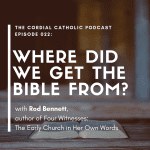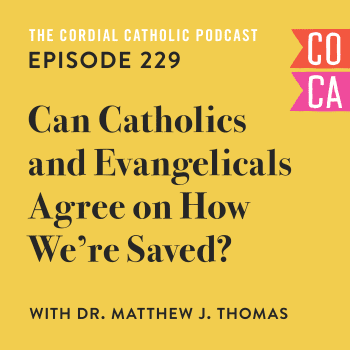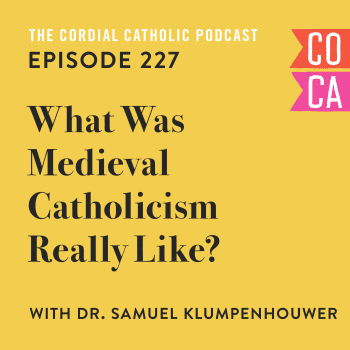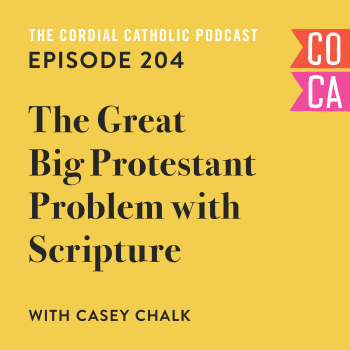
When I had a radical conversion to Christ in high school I knew nothing about denominations or apostolic succession or the history of the Bible. So, a few days after accepting Christ I bummed a ride over to the local Christian bookstore where I picked out the coolest looking Bible I could find—a big black faux-leather Xtreme Teen Study Bible, New King James Version.
So extreme it was missing an “e.”
Ridiculous as the whole thing sounds now that Bible was, quite literally, a Godsend. It opened up for me a world that I had no idea existed and reading it felt like placing my ear up to the door of Heaven and was listening in. Eavesdropping.
Like holding something magical in my hands.
Of course knowing nothing about anything I began at the beginning. I worked through Genesis and Exodus and onward only to get horribly bogged down somewhere in the middle of Numbers until someone told me I should start with the Gospels first.
“The what?” I said.
What I didn’t know then, and wouldn’t come to realize until fifteen years later, was that the Bible I was reading, the Old Testament Scriptures in particular, were incomplete.
Recently, I had the opportunity to chat with author and historian Rod Bennett. Rod wrote the incredible book The Apostasy That Wasn’t (highly recommended) and we’ve chatted earlier about that too.
This time around I asked Rod about the Bible—how it came to be—and what Rod shared with me, based on the research he’s just finished for a new book, was nothing short of shocking.
You see, Catholic Bibles are bigger. That New King James translation I bought in high school had a handful fewer books in the Old Testament section. This is because the New King James version of the Bible is a translation from a Hebrew collection of Old Testament books. When the translation was made, it was thought that since this was the collection of Hebrew Scriptures most commonly used by the Jews known to the Christian translators this must be the most accurate, complete collection of Hebrew Scriptures.
The most complete Old Testament. But that wasn’t necessarily true.
Catholic Bibles are bigger because our Old Testament collection is a translation from a Greek version of Hebrew Scriptures. The translation, called the Septuagint, was created for Jews living outside of the Holy Land and was also read by scholars and those interested in the Jewish religion.
The Septuagint, it turns out, has more books in its collection as well as many added elements to well known stories which also appear in the Hebrew version.
The Early Church, as Rod points out, accepted the Septuagint version of the Old Testament, with the “added” books. Documents and even affirmations of church councils point out that the apostolic Church founded by Christ, and passed on through bishops and the laying on of hands, included these extra books (and extra pieces of text within well-known stories) in the original canon of the Bible.
That is, the Bible used and affirmed by the Christians closest to when Jesus lived affirmed the bigger Bible.
But, as time went on and the Protestant Reformation challenge the authority and many ideas of the Catholic Church, the inclusion of these extra books and extra ideas began to be questioned—even by some prominent Catholics. After all, the Jews known to these more modern day Christians didn’t use or accept the Septuagint with its “extra” books but prefer a shorter Hebrew translation so why should Christian believers?
What Rod revealed in our interview, however, was kind of the ultimate mic drop on the biblical canon.
Since the discovery of the Dead Sea Scrolls, an incredibly preserved collection of Jewish Scriptures discovered in 1947, biblical scholars have come to believe that it is the Septuagint which is, actually, a more “complete” collection. Incredibly, says Rod, the preserved texts, dating from way back in Jewish history, match much more closely to the Greek Jewish Scriptures than they do to the Hebrew translation.
While the Septuagint was commonly thought of, even by some Catholics, as a more “corrupted” version of an original source it actually seems to be closer to the original than the Hebrew version used by the modern Jews.
Based on solid, archeological discoveries.
As Rod asked in our interview, “Is your head all explodey yet?!”
The Greek translation of the Old Testament, included in Catholic Bibles and affirmed by the Early Church, actually seems to be the more accurate and complete translation.
But there’s more.
Because even if we weren’t sure about the reliableness of biblical scholarship or the archeological discoveries coming out of the Dead Sea there’s a failsafe way of knowing which version of the Old Testament is right.
Jesus, says Rod, tells us.
In fact, we know from the New Testament itself where the apostles, the gospel writers, and the writers of the epistles quote from the Greek version of the Old Testament over 300 times. Almost exclusively, says Rod.
And why is the important? Because Jesus appointed those apostles, Jesus established the Church on the shoulders of those handpicked men, and if the Old Testament they quote from includes “extra books” and “added material” then shouldn’t it be good enough or us, too?
That is why Protestant Bibles are too small—because even the apostles quoted from the “bigger” version.
And that’s a major problem.
Because if the Septuagint version of the Old Testament can be proven, archeologically, to be a more original version of the Old Testament then that is a serious point in its favour. But if we can, verifiably, prove that it was also the version affirmed by the apostles and New Testament authors themselves then Protestants need to ask, very seriously, why it isn’t included in their Bibles.
After all, when Paul wrote to Timothy that “all Scripture is God-breathed, useful for teaching and correcting,” he was referring to a collection of Old Testament Scriptures that do not appear, in their entirety, in the Protestant Bible.
Listen to my complete interview with Rod Bennett below,












